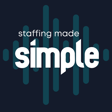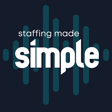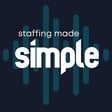
Win the Relationship, Not the Deal: Rethinking Sales in Staffing
In staffing sales, everyone claims to value relationships—but too often, the chase for quick wins takes over. This episode of Staffing Made Simple digs into what it really means to move beyond being “just another vendor.” It explores why clients can sense when your outreach is transactional, how to shift from chasing recs to earning trust, and what separates sales reps who get ignored from those who get invited to the table.
Joining us for this conversation is Casey Jacox, bestselling author of Win the Relationship, Not the Deal, and host of The Quarterback Dadcast. Drawing on his experience as a top national staffing salesperson, Casey shares how leading with service, consistency, and genuine curiosity builds lasting business partnerships. Whether you’re an account manager, recruiter, or sales leader, this episode will challenge how you think about success — and help you refocus on relationships that drive real results.


